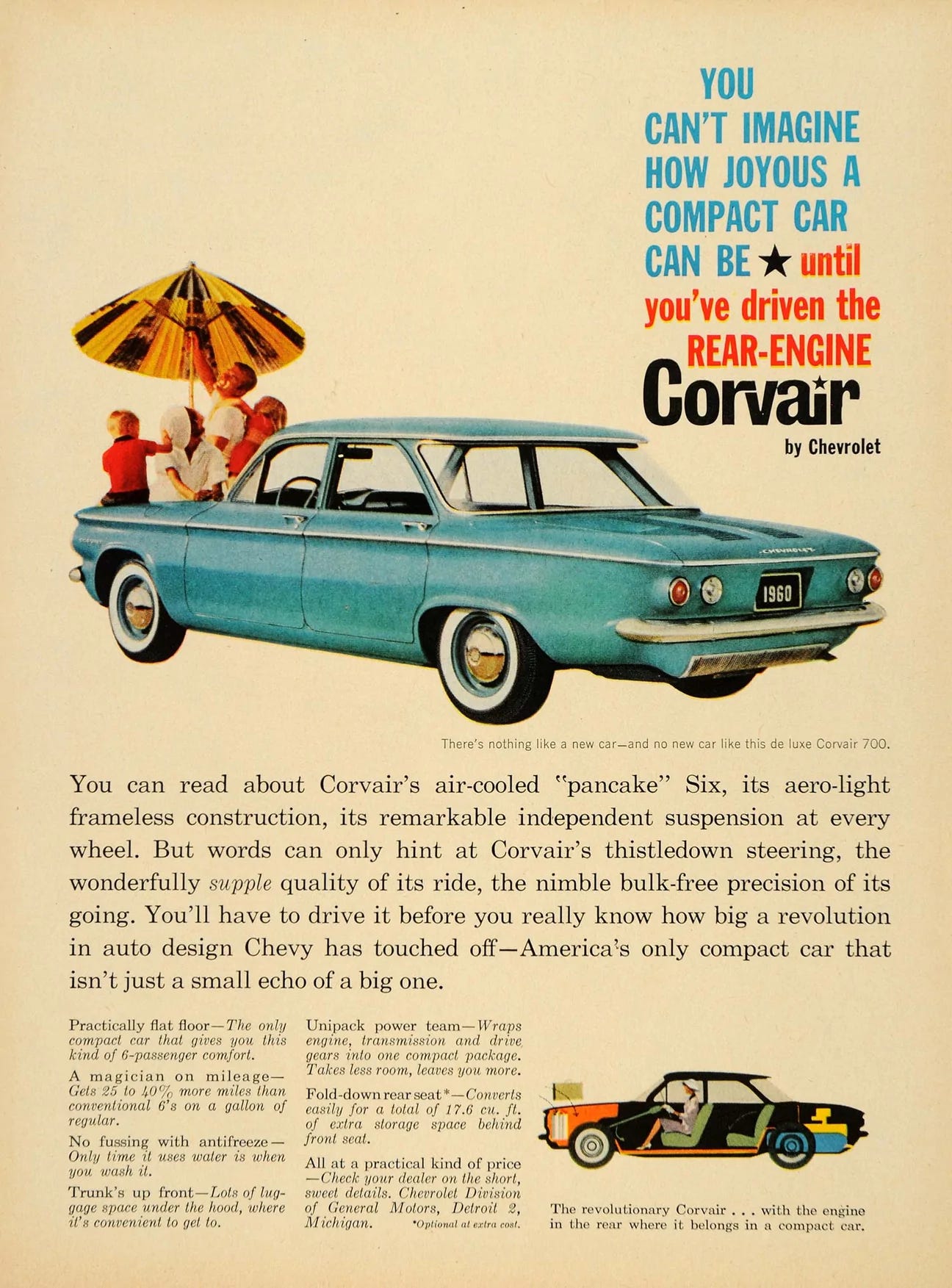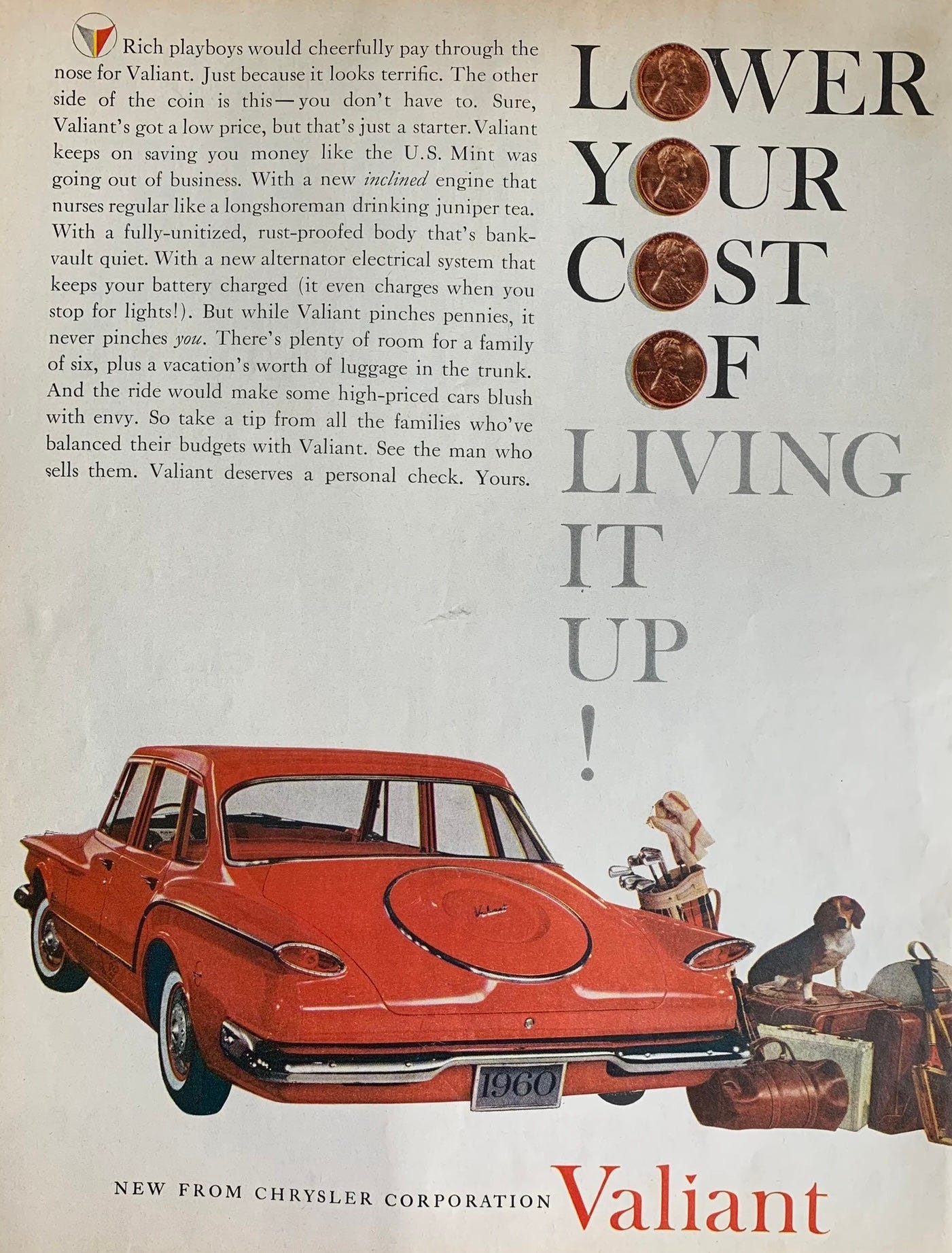Business: Competition Therein
Then the “big three” — General Motors, Ford, and Chrysler — brought out their compact cars — the Corvair, the Falcon, and the Valiant. Studebaker’s advantage was lost. Sales began to fall. The company began an accelerating downward slide, like a runaway croquet ball in Chacallit, on its way down Ackerman Hill, headed for the chilly waters of the Whatsit.
Herb ’n’ Lorna, Chapter 17
What is competition? It may be defined in general as rivalry for income by the method of giving more than one’s rivals give in proportion to what one asks in return, or by making the public think so, or by making them at least act as if they thought so to the extent of buying one’s goods in preference to those of one’s rival. Presumably the successful competitor is giving people what they want, or at least making them think he is giving them what he has made them think they want.
J. M. Clark, “What is Competition?” The University Journal of Business, Jun., 1925, Vol. 3, No. 3, pp. 217-240. Published by: The University of Chicago Press



Life: Its Vicissitudes, Its Shames and Humiliations, Its Follies, Its Burden of Pain, Care, and Misery
Herb was convinced, and he convinced the others … . The company would succeed. The stock would rise. All the Spotters believed him, and Herb believed himself. He also invested more and more heavily.
Slowly, as time passed and the fortunes of the company grew worse and worse, Herb came to see that he had finally done the foolish Piper thing. … The stock would not rise. The Spotters would lose their money. So would he and Lorna. Herb was ashamed.Herb ’n’ Lorna, Chapter 17
As a little child aged seven, [Susy] was oppressed and perplexed by the maddening repetition of the stock incidents of our race’s fleeting sojourn here. . . . A myriad of men are born; they labor and sweat and struggle for bread; age creeps upon them; infirmities follow; shames and humiliations bring down their prides and their vanities; those they love are taken from them, and the joy of life is turned to aching grief. The burden of pain, care, misery, grows heavier year by year; at length ambition is dead; pride is dead; vanity is dead; longing for release is in their place. It comes at last—the only unpoisoned gift earth ever had for them—and they vanish from a world where they were of no consequence; where they achieved nothing; where they were a mistake and a failure and a foolishness. . . . Then another myriad takes their place, and copies all they did, and goes along the same profitless road, and vanishes as they vanished—to make room for another and another and a million other myriads to follow the same arid path through the same desert and accomplish what the first myriad, and all the myriads that came after it accomplished—nothing! “Mamma, what is it all for?” asked Susy.
Doesn’t the happiest group of people comprise those popularly called idiots, fools, nitwits, simpletons—all splendid names according to my way of thinking? Perhaps what I’m saying seems foolish and absurd at first sight, but really it’s a profound truth. . . . They are neither tortured by dread of impending disaster nor under the strain of hopes of future bliss. In short, they are untroubled by the thousand cares to which our life is subject. They don’t feel shame, fear, ambition, envy or love. . . . Now, foolish sage, please count up for me all the nights and days when your soul is tortured by anxieties—heap all your life’s troubles in one pile, and then at last you’ll realize what the evils are from which I’ve saved my fools. Add the fact that they’re always cheerful, playing, singing, and laughing themselves, and bring pleasure and merriment, fun and laughter to everyone else wherever they go as well, as if the gods had granted them the gift of relieving the sadness of human life.
Folly, in Erasmus of Rotterdam’s Praise of Folly (1509)
See also: Life: Metaphors and Similes for TG 40, TG 55, TG 60; Phases of TG 89; Life and Death TG 92; Yearning for Another, Different, Better TG 100, TG 104; Life: Its Vicissitudes TG 146; Life Imitates Art (More or Less) TG 153; Stages of: Puberty TG 164
Have you missed an episode or two or several?
You can begin reading at the beginning or you can catch up by visiting the archive or consulting the index to the Topical Guide.
You can listen to the episodes on the Personal History podcast. Begin at the beginning or scroll through the episodes to find what you’ve missed.
You can ensure that you never miss a future issue by getting a free subscription. (You can help support the work by choosing a paid subscription instead.)
At Apple Books you can download free eBooks of “My Mother Takes a Tumble,” “Do Clams Bite?,” “Life on the Bolotomy,” “The Static of the Spheres,” “The Fox and the Clam,” “The Girl with the White Fur Muff,” “Take the Long Way Home,” “Call Me Larry,” and “The Young Tars,” the nine novellas in Little Follies, and Little Follies itself, which will give you all the novellas in one handy package.
You’ll find overviews of the entire work in An Introduction to The Personal History, Adventures, Experiences & Observations of Peter Leroy (a pdf document) and at Encyclopedia.com.


